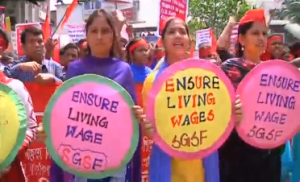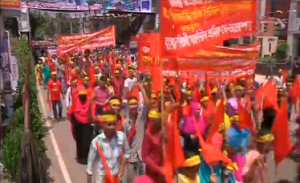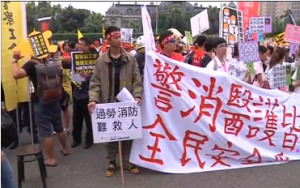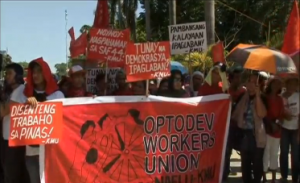
MAY 1 (Reuters) — Marches in various cities in Asia on Friday (May 1) rallied for workers’ rights on May Day.
In Dhaka, thousands of workers took to the streets to demand better working conditions, especially for those working in garment factories.
“We don’t want to see anymore Rana Plazas, no more Tazreen in Bangladesh. This means that we want to see the garment industry and the workers who work there have a safe working condition in Bangladesh. Our second demand is for our working condition as well as workers’ wages to be higher than the present because this is the highest foreign exchange earner for the country. That is the reason they (garment industry workers) need proper wages and standards of living as well as their trade union rights,” President of the Garment Workers Federation, Haque Amin said.
The collapse of Rana Plaza shone a light on unsafe working conditions in the ready-to-wear industry.

More than 1,100 workers were killed when the building collapsed in 2013, creating urgent demands for global retailers to do more to ensure the safety of their workers in Bangladesh, the world’s second biggest garment exporter after China.
In Taiwan, around 2,000 protesters rallied near the Presidential Office in the heart of the capital Taipei before marching through the streets.

Firefighter Yu Zong-Han urged the government to give them better working hours.
“In some counties, we work two days in a row and have one day off, we have to work 48 hours in a row. So we can’t even sleep for five hours a night, which would cause our firefighters to be too tired to drive vehicles. That is equal to driving under the influence of alcohol. This is very dangerous,” he said.
More than a thousand activists marked Labor Day in the Philippines with a rally for higher wages.
Protesters from different labor groups marched on the streets, carrying placards and banners urging the government to raise the minimum daily wage due to the rising cost of goods.
The national wage board has raised the daily minimum wage of laborers in Manila by 15 pesos ($0.34) last month, pegging the wages to 481 pesos ($11).
Labour activists said the increase was not enough.

“There should be a wage increase. Every worker should have a 16,000 ($364) pesos monthly minimum wage, which has been our wish, and to prohibit replacing regular workers with temporary workers and to regularize temporary workers,” said labour rights group May One Movement’s ViceChairperson Lito Ustares.
The national statistics office said poverty in the Philippines has risen by 1.2 percent in 2014 compared to the 24.6 percent in 2013.
More than a quarter of the Philippine population is under the poverty line.
Unemployment, low wages and weak labour rights have forced thousands of Filipino labourers to migrate to other countries in search of better opportunities








